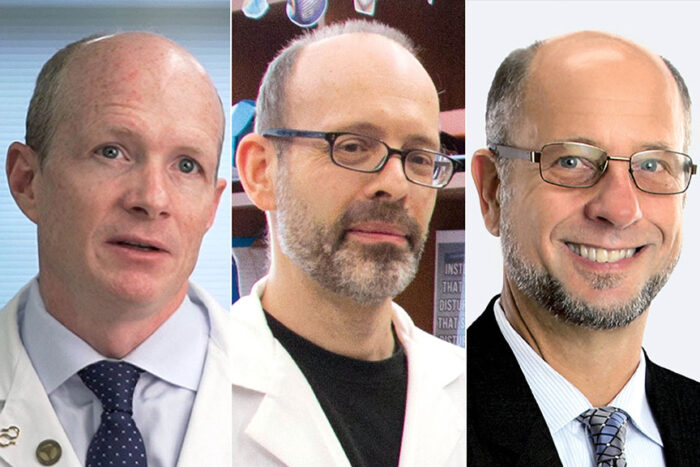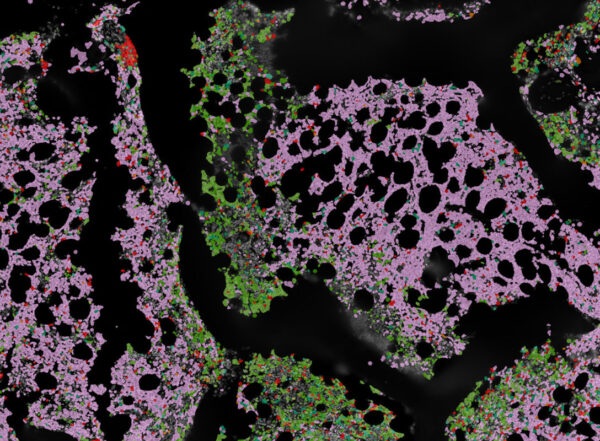Bateman, Diamond, Hultgren named to National Academy of Inventors
School of Medicine scientists honored for innovation
 Washington University Photographic Services
Washington University Photographic ServicesWashington University School of Medicine in St. Louis faculty members (left to right) Randall J. Bateman, MD, Michael S. Diamond, MD, PhD, and Scott Hultgren, PhD, have been elected fellows of the National Academy of Inventors.
Neurologist Randall J. Bateman, MD, virologist and immunologist Michael S. Diamond, MD, PhD, and microbiologist Scott Hultgren, PhD – all faculty members at Washington University School of Medicine in St. Louis – have been named fellows of the National Academy of Inventors, the highest professional distinction accorded solely to academic inventors.
They are among 175 new fellows elected this year in recognition of their innovation in creating and facilitating outstanding inventions that have made a tangible impact on quality of life, economic development and the welfare of society. They will be honored at a ceremony during the academy’s annual meeting in June in Tampa, Fla.
Randall J. Bateman
Bateman, the Charles F. and Joanne Knight Distinguished Professor of Neurology, is being recognized for his pioneering work in diagnostics and clinical treatment for Alzheimer’s disease. His research into techniques to detect molecular signs of Alzheimer’s has led to the first blood test approved under the Clinical Laboratory Improvement Amendments (CLIA), to aid in the diagnosis of Alzheimer’s. The aim of the CLIA program, under the Centers for Medicare & Medicaid Services, is to ensure quality laboratory testing in people. The Alzheimer’s test, made by the startup company C2N Diagnostics, became available to patients and physicians in October.
Bateman co-founded C2N in 2007 with David Holtzman, MD, the Andrew B. and Gretchen P. Jones Professor and head of the Department of Neurology, to provide a technology the two had developed called SILK, or stable isotope labeling kinetics. The technology measures the breakdown and synthesis rates of neurological proteins important in Alzheimer’s disease, such as amyloid beta, tau and others, data that can be crucial for evaluating the effectiveness of potential Alzheimer’s drugs. Multiple large pharma companies have partnered with C2N to use SILK to help assess drugs in clinical development.
More recently, Bateman has focused on developing sensitive techniques for detecting Alzheimer’s proteins in blood. The approved blood test is based on identifying the presence of amyloid beta, but he also is working on a promising blood test for tau.
Bateman earned his bachelor’s degree at Washington University in 1996, and his medical degree at Case Western Reserve University School of Medicine in Cleveland in 2000. He completed his residency at Barnes-Jewish Hospital and a clinical fellowship at Washington University School of Medicine before joining the faculty in 2005.
His many honors include the Chancellor’s Award for Innovation and Entrepreneurship, the MetLife Award in Medical Research and the Potamkin Prize for Research in Pick’s, Alzheimer’s, and Related Diseases, an international recognition sometimes referred to as the Nobel Prize for Alzheimer’s research. He is an elected fellow of the National Academy of Medicine.
Michael S. Diamond
Diamond, the Herbert S. Gasser Professor of Medicine, a professor of molecular microbiology, and of pathology and immunology, is being recognized for his accomplishments developing research tools and drug and vaccine candidates for emerging viruses such as West Nile, dengue, chikungunya, Zika and SARS-CoV-2, the virus that causes COVID-19.
Most recently, Diamond developed research tools to aid the international search for treatments and preventives for COVID-19, including a mouse model for COVID-19. He helped identify antibodies that are undergoing clinical testing as potential drugs for COVID-19, and developed two vaccine candidates that have shown promise in animal studies, one of which soon will be the focus of a vaccine trial in people.
During the Zika epidemic, Diamond helped develop the first mouse model and the first pregnant mouse model of Zika infection, enabling research into the devastating neurological damage seen in the fetuses of infected pregnant women. He conducted pivotal preclinical studies to advance a Zika vaccine, and identified antibodies against Zika virus that led to two novel diagnostic tests to detect Zika virus in patients.
Diamond earned his medical and doctoral degrees from Harvard in 1994. After completing a research fellowship in molecular and cell biology at the University of California, Berkeley, Diamond moved to the University of California, San Francisco, where he completed his residency in internal medicine and a clinical fellowship in infectious diseases. He returned to Berkeley to complete another research fellowship in infectious diseases in 2001, before joining Washington University School of Medicine that year.
Diamond is an elected fellow or member of the American Association for the Advancement of Science, the American Society for Clinical Investigation, the American Academy of Microbiology, the Association of American Physicians and the National Academy of Medicine.
Scott Hultgren
Hultgren, the Helen L. Stoever Professor of Molecular Microbiology, is being recognized for his pioneering research in nonantibiotic treatments and preventives for urinary tract infections (UTIs), one of the most common infections in women.
Current therapies use antibiotics to kill bacteria in the urinary tract, but they are often ineffective and can promote drug resistance. Hultgren discovered bacterial and host mechanisms that determine the onset, course and outcome of UTIs, including discovering how E. coli bacteria evade the immune system and form stable, protected bacterial communities known as biofilms. This work has led to the identification of alternative therapies based on preventing bacteria from causing disease without killing them, such as compounds that target bacterial attachment to human tissues. His work also has led to an investigational vaccine that has completed phase 1a/1b clinical trials and has been allowed by the U.S. Food and Drug Administration (FDA) for compassionate use in patients with multidrug-resistant UTI caused by E. coli.
Hultgren co-founded Fimbrion Therapeutics, which is developing decoy sugars known as mannosides as nonlethal antimicrobials to eliminate bacteria from the urinary tract. These compounds are in phase 1 clinical trials. He is also a cofounder of Quretech Bio, which is working to develop first-line drugs to combat infectious diseases and prevent antibiotic resistance.
Hultgren earned his doctoral degree from Northwestern University in 1987 before moving to Sweden to do postdoctoral research under Staffan Normark, PhD, at the University of Umeå. Normark joined Washington University as head of the molecular microbiology department in 1989 and recruited Hultgren to join the faculty later that same year.
Hultgren holds 22 U.S. patents and has four pending patent applications. His many honors and awards include the Eli Lilly Microbiology Award and election to the National Academy of Medicine, the National Academy of Sciences and the American Association for the Advancement of Science.






